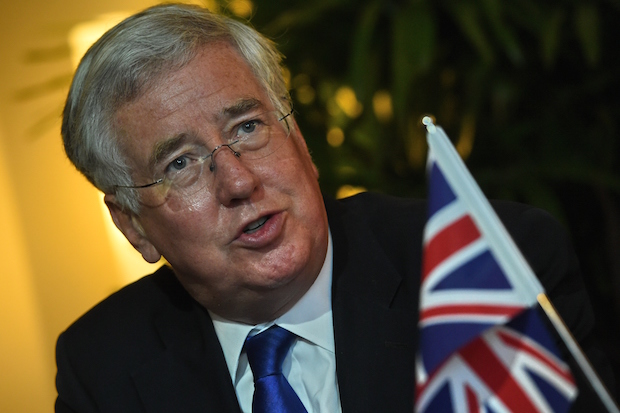Is the government set to bring bombing Islamic State terrorists in Syria before the Commons soon? The Defence Secretary Michael Fallon has announced that the RAF’s Tornado aircraft will be kept in service until 2017 for air strikes against the Islamic State, to ‘ensure we maintain this crucial operational tempo’. On the Today programme, Fallon explained that the aircraft have ‘proven their worth’ and have helped Iraqi forces in the fight against ISIL:
‘The Iraqi forces are slowly but surely beginning to push ISIL back. They have recaptured Tikrit, there is a campaign going on at the moment to liberate Ramadi. They are recruiting to both the army and to the local police and they are starting to push ISIL back northwards up the Tigris and west along the Euphrátēs. But they still of course need air power and air support to do that.’
Fallon also claimed that Britain is playing an important part in the international coalition against ISIL. The defence secretary said we are the second most active partner in the coalition behind the US. But the gap between first and second in this case is huge: Britain is contributing just five per cent of air strikes:
‘We’re already flying six days a week, pairs of aircraft each day and each night. We’re playing the second part probably behind the United States in the number of missions that are being flown. It isn’t the number of aircraft, it’s where they are and what the rest of the coalition — and there are some 16 other countries involved in strikes against ISIL — what they would welcome is certainly the participation of Tornado in strikes against ISIL headquarters in Northern Syria.
But given the general election result and changing circumstances, Fallon hinted again that the government will bring the question of bombing in Syria back to Parliament in the near future — albeit in a different form to the unsuccessful 2013 proposals:
‘But to do that, obviously, we need the authority of Parliament and we have a new Parliament now. At some point, the new parliament will have to reflect on the logicality of our planes turning back if you like, while other counties fly on to deal with ISIL’s headquarters.’
Yet despite Fallon’s bullish talk of progress, he is battling against the notion that Britain’s strategy against the Islamic State isn’t very well thought out — or ‘incoherent’ in the words of the defence select committee chair Julian Lewis. Fallon said ‘I don’t accept that’:
‘We’ve got behind the legitimate government of Iraq. We have committed our aircraft to the fight. We have nearly 900 people in the region, servicemen and women. It’s our largest overseas military commitment at the moment. We’re doing a lot else to tackle the financing of ISIL, to try and counteract its poisonous ideology and its strategic communications. But where we can help directly is in training and equipping the Iraqi army and in bringing our airpower, which we can provide, bringing that to bear in support of their ground forces.’
Given the continuing air strikes and the prospective Syria vote in Parliament, it will pose a challenge for the next Labour leader. Ed Miliband managed to halt any progress towards bombing in Syria during his tenure as leader. For Jeremy Corbyn, Yvette Cooper or Andy Burnham, it will likely be the first test of their mettle and first opportunity to signal what Labour’s foreign policy will be.






Comments